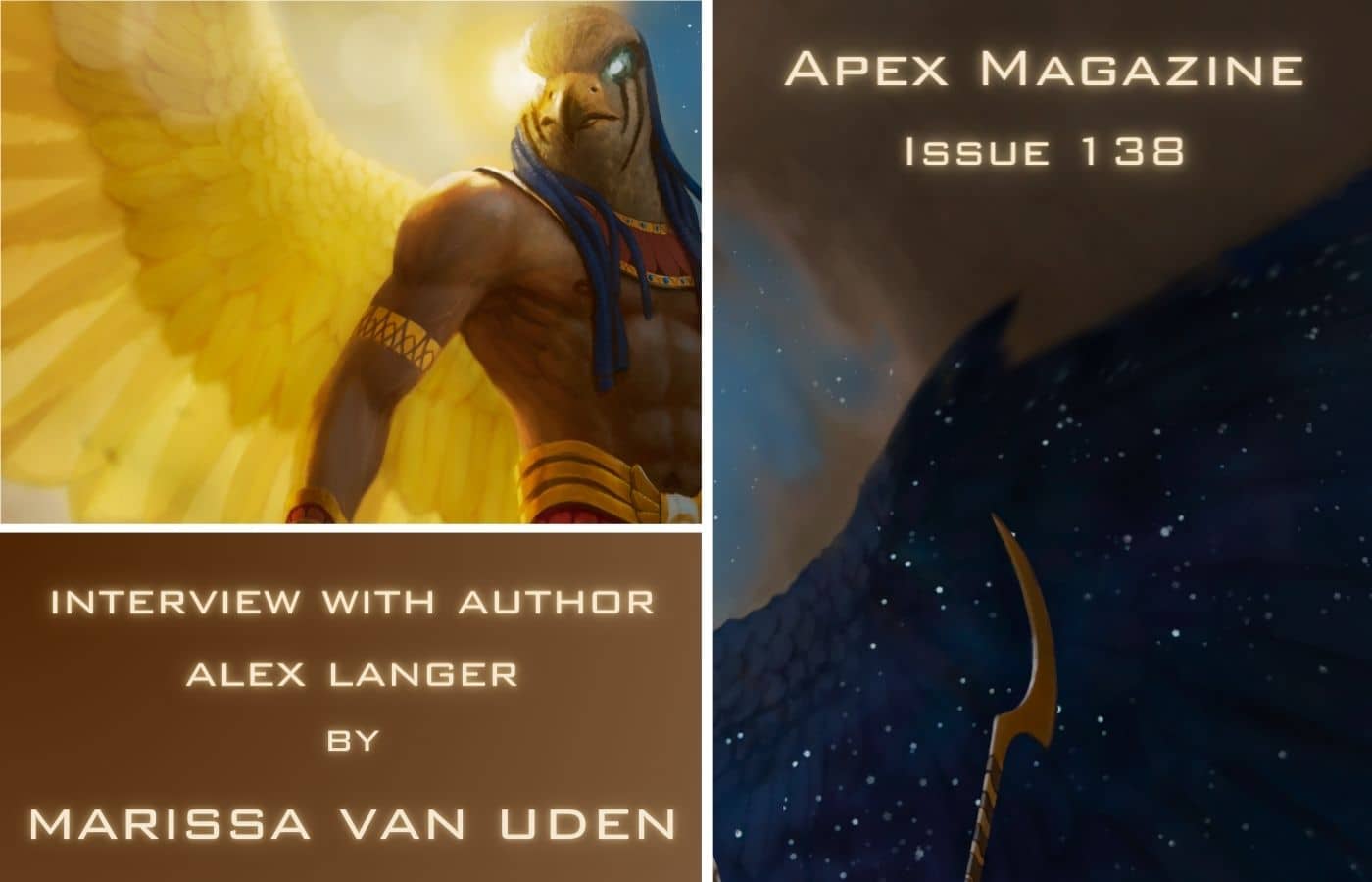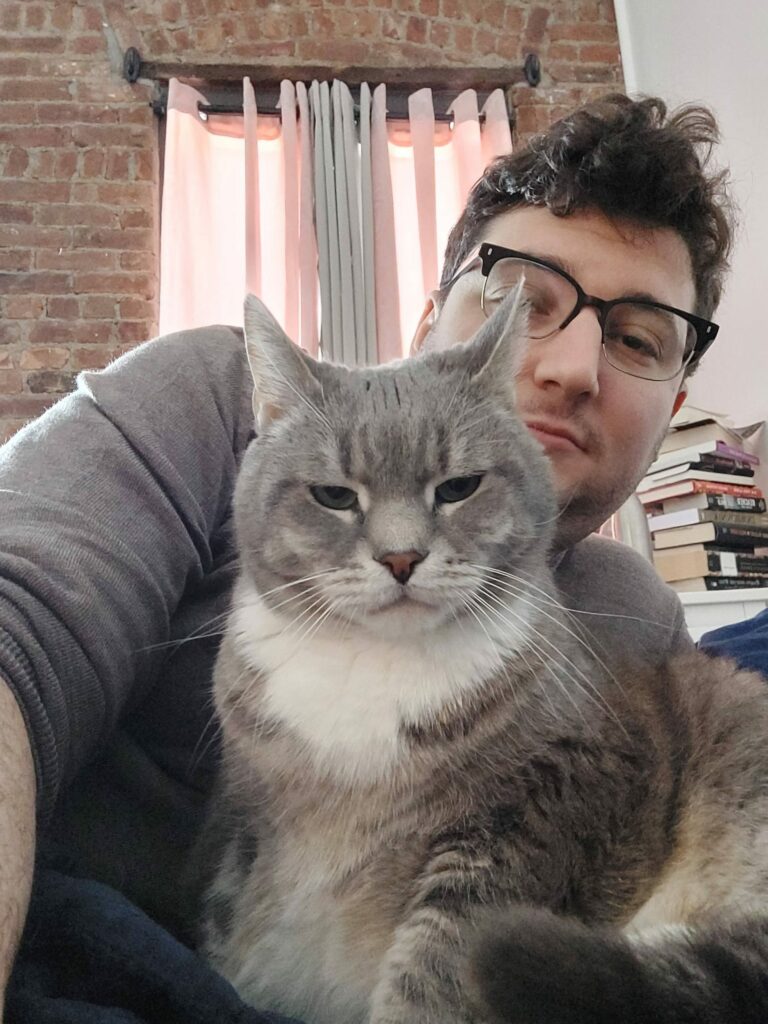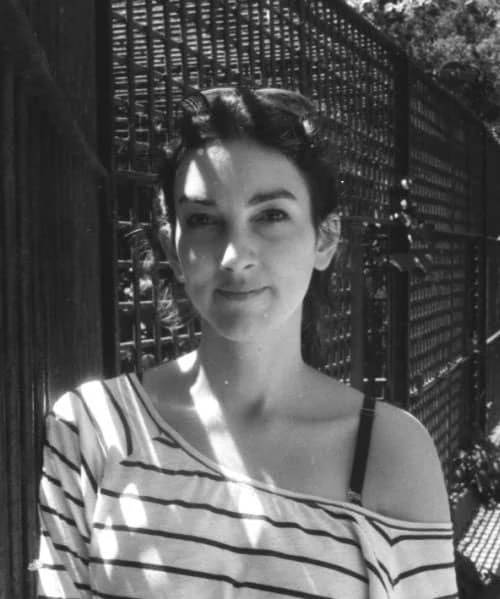
In “The Relationship of Ink to Blood,” we meet the Clerk, a man who is obediently working for a fascist state, helping to log and file the lives destroyed by it. He lives in a state of trained incomprehension, not understanding how or why people would push back against the state, how they could not follow order like he does. He’s rewarded for his patriotism in some ways, and yet he’s also an isolated lonely man sitting in a cage he himself is helping to maintain, pining for love from the very people he helps to destroy.
Alex Langer is a Canadian Jewish writer and lawyer based in Brooklyn. He lives near the park with his wife and fluffy mobster of a cat. His short fiction has appeared in On Spec and the Upon a Once Time anthology from Air and Nothingness Press, and is forthcoming in Monster Lairs from Dark Matter Ink. You can find him at @AlexLanger1993 on Twitter.
Marissa van Uden: Thanks for joining us to talk about this beautiful and harrowing story, Alex. You did an amazing job of showing a character who is pushed and pulled by the very human yearning for friendship, love and connection, even while he is obediently and inhumanely helping to deny these things to others. How challenging was it to try to get into the head of the Clerk and write this story from his perspective?
Alex Langer: It was definitely a challenge, particularly some of the more unsettling things that the Clerk does in his pursuit of those human connections. I had to push myself and write through discomfort quite a lot, but I think it produced a believable result and a character who is, if not sympathetic—the Clerk is very much not sympathetic, to me—someone who the reader can comprehend and maybe even see some of themselves in. Even monsters have feelings, after all.
MVU: This story shows us how information and photographs collected by the secret police, intended as a tool of repression by the state, also become a historical record of individuals who fight back against fascists, an archive of heroic counterinsurgency as well as evidence of the state’s crimes. The Clerk is both fascist oppressor and inadvertent historian. What inspired you to write about this subject and character?
AL: In college, I read a book called Paper Cadavers: The Archives of Dictatorship in Guatemala by Professor Kirsten Weld, to whom I owe a great debt. The book is part history of Guatemala’s National Police through the country’s long period of dictatorship after the 1953 CIA-backed coup d’etat; part account of the discovery and rescue from oblivion of the National Police’s archive—which the police had denied existed for decades, but was actually decaying in an obscure warehouse in Guatemala City; and part ethnography of the people who rescued and reconstructed the archive. Many of those people were themselves rebel veterans of the Guatemalan Civil War and were working as much to find what happened to disappeared loved ones as they were aiming to rescue the history itself. That book seared itself into my brain for years, and eventually I had to write a story about it.
While this story isn’t set in Guatemala specifically—it’s a story about many, many regimes—it’s inextricable from that context. The crime of disappearing someone is really killing them twice, erasing both them and the possibility of memorializing them. It’s something that horrifies and enrages me, and I wanted to express that, and maybe give the victims of that kind of crime an opportunity, if only in fantasy, to receive some satisfaction.
I also wanted to explore what kind of person works for a regime like this. A dictatorship isn’t just a dictator but also the many people who make up the regime machinery. “The banality of evil” is a bit cliché, but these are regular people and monsters at the same time. The Clerk is someone you might recognize, in others or even in yourself.
 Alex Langer's beloved writing companion, Bean Bean
Alex Langer's beloved writing companion, Bean Bean
MVU: Did you do a lot of research while writing this and was there anything you discovered that you really wanted to include but didn’t make it into this story?
AL: My writing process is the opposite of methodical—I tend to just start writing and let it flow—so I didn’t do a lot of specific research. I reread Paper Cadavers, and read accounts of dictatorship in other times and places, from the regimes challenged by the Arab Spring to the Southern Cone dictatorships of the 1970s to the Soviet bloc.
There’s nothing specific I really wanted to include that didn’t make it in, but I’ve tried to make clear the incredible cruelty of regimes like the one the Clerk works for without making things too lurid, which I think sometimes distracts from the horror rather than enhances it. One example I cannot forget about is what happened to folk musician Victor Jara after the 1973 coup in Chile. The soldiers who arrested Jara, prior to murdering him, allegedly broke his wrists and hands so that he would never again be able to hold a guitar. The Pinochet regime subsequently attempted to destroy all master recordings of his music and concert performances, to erase his voice even from beyond the grave.
MVU: Oh my god, that is horrific. Victor Jara’s story is one I need to look up and learn about now. There is a powerful turning point in the story where the character Marie appears to the Clerk and pulls him into an embrace at the same moment the records and photographs of everyone he and the state are trying to disappear begin to cut him. Could you talk a little about this scene, how did it play out in your mind originally, and then how did that translate to the page?
AL: Endings are the part of writing a story I tend to find most difficult. As I approached the end of writing my first draft, I think my initial plan was for the Clerk to die in the fire that he tries to set in the warehouse, or perhaps to self-immolate rather than burn the documents as he’s been instructed to. It’s a powerful moment: it’s the first time the disappeared ones really claim agency in the story, and it needed to come off right. The initial draft wasn’t working for a bunch of reasons, but that—and some broader issues with Marie’s characterization—was one of them.
I talked about it with my wife Marika Bailey, who is also a spec-fic writer (please read her work, it’s amazing), and she suggested that a storm of paper might do more to get across what I wanted thematically. Actually, transitioning that to the page and blocking the scene was a process, as I tend to overwrite stage directions. It took a lot of drafting and redrafting to get it right, but I think I managed in the end.
MVU: That’s so cool your wife is a writer too! I love that. Also, super cool you can help brainstorm creative ideas with each other. Could you tell us a little about your writing practice? Do you have any set writing rituals or techniques you follow to either get started or finish pieces?
AL: I really don’t. I try to sit down, shut off Twitter, and force myself to write for a couple hours on the weekend, and I write on the subway on the way to and from work when I can, but writing for me tends to just happen when it happens. An opening to a story—or sometimes a whole story—will pop into my head and I pretty much have to start writing immediately and just write until I run out of steam. From there, I try to loosely outline the remaining scenes—usually nothing more than a sentence or two about what happens—and write the story sentence by sentence (or more if the words are flowing).
MVU: How would you describe your reading habits: when and where do you get most of your reading done, and do you gravitate towards certain genres or subjects?
AL: Most of my reading gets done on public transit on my phone (the Kindle app), or before I go to bed. For the latter, I try to stick to nonfiction, as it’s easier to put down at the end of a chapter and not read until 3 am when I have a workday the next day. I’m in a bit of a reading slump lately, but I tend to gravitate towards fantasy and supernatural horror (as well as a bit of romance) in my fiction, and history (especially labor and social history) in my nonfiction. I’m currently reading a book about the 1912 Lawrence textile strike, which is giving me a lot of ideas.
 Alex Langer's beloved writing companion, Bean Bean
Alex Langer's beloved writing companion, Bean Bean
MVU: What pieces of fiction that you love (in any medium) do you find yourself recommending to friends and other writers most often?
AL: Oh boy. In terms of writing, I repeatedly recommend The Goblin Emperor to anyone who will listen. It just has such strong worldbuilding and such a wonderful central character. It’s a perpetual comfort re-read for me, and I find something new to love every time I do. For horror, John Hornor Jacobs’ double-feature book A Lush and Seething Hell is fantastic. Its first story, “The Sea Dreams It Is the Sky,” absolutely inspired this story, and “My Heart Struck Sorrow” made me melancholy and heartbroken for days after.
In terms of other media, I have a huge soft spot for ersatz father-daughter relationships, and I keep recommending the film The Outfit to people. It’s a gangster film, but it’s got Mark Rylance in it, and it’s set like a stage play in the best way possible.
MVU: Oh, that’s my soft-spot for character relationships too. I’ll definitely be checking out this film. Where else can writers find your stories, and can you tell us about anything you’re working on at the moment or excited to start writing?
AL: I’m in the process of making a website, which will eventually be linked on my Twitter. Most recently, I had my story “Fire Flows Downhill” come out in On Spec in December. It’s a weird little story about a dragon, if the dragon was a fire-breathing manifestation of imperialism, and what the survivors of its violence might do to get vengeance against that system.
I’m currently working on a couple of stories. I’ve got one in the works for the Robotic Ambitions anthology which may or may not get finished by the submission deadline. I’m also working on a couple of very Canadian stories—beaver selkies! a retelling of a Quebecois folk-tale inspired by the songs of The Tragically Hip!—and I’ve got other WIPs on the shelf. Finding the time is always tough though.
MVU: These all sound amazing! I’ll definitely be keeping an eye out. Thank you so much for writing this impactful story and for sharing a bit about its creation with our readers!
AL: Thank you! I’m honored to be on the same stage as so many writers I deeply admire, and to have the opportunity to share this story with everyone.









